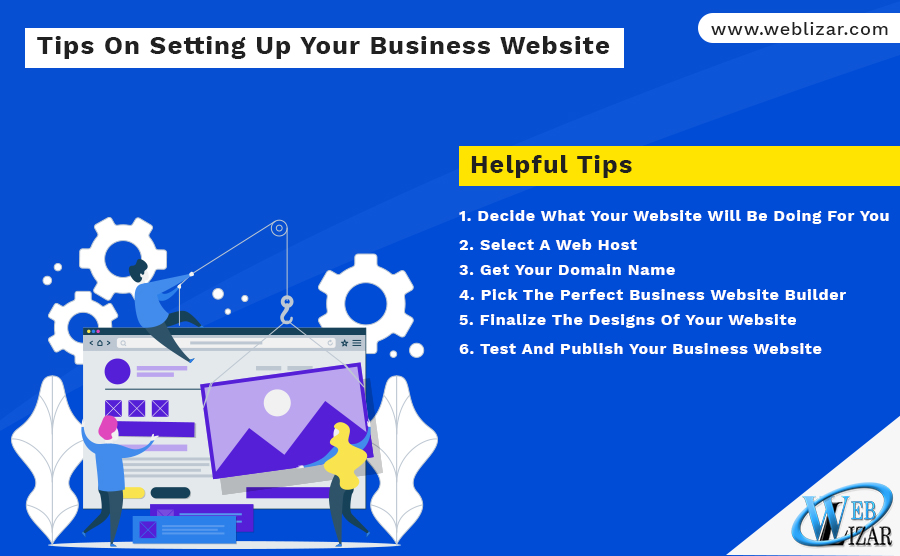With today’s advancements in technology, there’s no doubt that any small business online is booming. With a strong web presence, you can open your business up to a global audience and start generating more money. That’s because most consumers these days go to the Internet to search for everything—from the product or services to the location and contact details. If you’re selling products and services online, having a business is essential to remain competitive in the market.
Continue reading for essential tips on setting up your small business website.
1. Decide What Your Website Will Be Doing For You
When building out your first business website, it’s crucial to decide on its purpose. It’s more about knowing what your site will be doing for you to gain more profit and to help you develop it going forward. Below are the things you may want to do for your website:
- Provide information regarding your business, credentials, and services to prospective customers
- Provide useful information about your products or services to existing and potential customers
- Sell products or services directly online
- Create a blog section as part of your digital marketing strategy so you can attract and engage with your customers and prospects
2. Select A Web Host
Another vital thing to consider when setting up a business website is the selection of a web host. It’s a location where your site will be made visible to your visitors. If you have your own server, you can do the hosting of your website by yourself. If you don’t have one, there are numerous hosting providers that you can choose from. When doing your search, try to consider a lot of factors to make a sound and informed decision later on. Keep in mind the amount of traffic you expect your site to receive, so you’ll know whether to start with a less expensive web host or go for a powerful dedicated hosting. Moreover, you should also take into consideration the price, reliability, and the installation of the content management software you’ve chosen when searching for a web host.
If you want to choose a reliable web host that suits your needs, follow this hosting guide for SMBs to help you in the selection process.
3. Get Your Domain Name
In order to get your website in place, you need to get a domain name and have it registered. A domain name, for instance, is the URL you’ll share with your target audience. That’s why you should choose one that is easy to remember, short, and descriptive to prevent confusion. Once you’ve chosen your domain name, make sure to check its availability and then have it registered with a domain registrar such as Squarespace, Wix, and many more. Also, be careful about copyrights to ensure you’re not making any infringement.
There are lots of websites reviewing tools to setup your website, like PCMag, Website Tool Tester and Binmy. I suggest reviews from Binmy.com, because it is an open review website and anyone can suggest reviews or correct the existing one.
4. Pick The Perfect Business Website Builder
If you choose the right website builder, setting up your own site can become an easy and less complicated project for you. In addition to a web host, website builders are tools that can help you build websites without needing to edit codes manually. However, choosing the perfect one requires a lot of research and consideration of some factors, including the design, technical skill level, and multiple features you may need for your site.
To get the most out of your business website, using an all-in-one builder may work and make the entire process successful.
5. Finalize The Designs Of Your Website
You can set up your own site if you have a background and skills in designing, along with the help of several web design packages. If you don’t have the experience to do so, you can always hire a web designer to do the work for you. However, it’s also important to keep the essential characteristics of an organized website in mind before getting started.
- First, you have to make sure your site has easy-to-use navigation and accessible information.
- Second, don’t forget to keep the design simple yet attractive.
- Third, see to it that your contact information is visible on your site. Also, formulate a privacy policy in case you’ll solicit personal info from your customers.
6. Test And Publish Your Business Website
Before you publish and market your website on search engines or social media, make sure it’ll work on all browsers such as Firefox, Chrome, Internet Explorer, and many others. Test your site by clicking on each page opened on every browser you use. That way, you can check whether the links are correct and the images and formats look good.
In addition, pay attention to the analytics program of your website to ensure you can address issues as quickly as possible. By checking on the analytics, you can keep track of each page performance and find out its success rate.
Conclusion
Staying relevant and visible in the online world is vital for small business owners like you. Thus, start a website for your business now by using the tips mentioned above. Remember, setting up a website can help your company become credible to a wider customer base. As a result, it can improve brand awareness, increase traffic, and grow sales.

